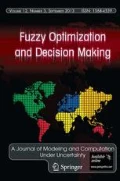Abstract
We extend the notion of stochastic order to the pairwise comparison of fuzzy random variables. We consider expected utility, stochastic dominance and statistical preference, which are related to the comparisons of the expectations, distribution functions and medians of the underlying variables, and discuss how to generalize these notions to the fuzzy case, when an epistemic interpretation is given to the fuzzy random variables. In passing, we investigate to which extent the earlier extensions of stochastic dominance and expected utility to the comparison of sets of random variables can be useful as fuzzy rankings.


Similar content being viewed by others
Notes
Wang and Kerre assume that the fuzzy ranking produces a complete order, which is not always the case for our imprecise stochastic orders; this is why we have included (A0) in our discussion. In addition, axioms (A4), (A5) and (A6) correspond to (A4\(^{\prime }\)), (A6) and (A7) in that paper, their (A5) not being too interesting in our context.
Our result is more general because we establish the equality between these two lower previsions on gambles, and not only events, and for this we need to establish the complete monotonicity of these previsions.
References
Adamo, J. M. (1980). Fuzzy decision trees. Fuzzy Sets and Systems, 4, 207–219.
Aiche, F., & Dubois, D. (2010). An extension of stochastic dominance to fuzzy random variables. In Proceedings of IPMU’2010.
Aiche, F., & Dubois, D. (2012). Possibility and gradual number approaches to ranking methods for random fuzzy intervals. In Proceedings of IPMU’2012.
Castaldo, A., Maccheroni, F., & Marinacci, M. (2004). Random correspondences as bundles of random variables. Sankhya, 66(3), 409–427.
Choquet, G. (1953). Theory of capacities. Annales de l’institut Fourier, 5(131–295), 1953–1954.
Couso, I. (1999). Teoría de la probabilidad para datos imprecisos. Algunos aspectos. Ph.D. thesis, University of Oviedo.
Couso, I., & Dubois, D. (2012). An imprecise probability approach to joint extensions of stochastic and interval orderings. In Proceedings of IPMU’2012.
Couso, I., Montes, S., & Gil, P. (2002). Second order possibility measure induced by a fuzzy random variable. In C. Bertoluzza, et al. (Eds.), Statistical modeling, analysis and management of fuzzy data (pp. 127–144). Berlin: Springer.
Couso, I., & Sánchez, L. (2011). Upper and lower probabilities induced by a fuzzy random variable. Fuzzy Sets and Systems, 165, 1–23.
de Campos, L. M., & González Muñoz, A. (1989). A subjective approach for ranking fuzzy numbers. Fuzzy Sets and Systems, 29, 145–153.
de Cooman, G., Troffaes, M., & Miranda, E. (2008). \(n\)-Monotone exact functionals. Journal of Mathematical Analysis and Applications, 347, 143–156.
De Schuymer, B., De Meyer, H., & De Baets, B. (2003). A fuzzy approach to stochastic dominance of random variables (pp. 253–260). LNAI 2715.
Denoeux, T. (2009). Extending stochastic ordering to belief functions on the real line. Information Sciences, 179, 1362–1376.
Destercke, S., & Couso, I. (2015). Ranking of fuzzy intervals seen through the imprecise probabilistic lens. Fuzzy Sets and Systems, 278, 20–39.
Dubois, D., & Prade, H. (1983). Ranking fuzzy numbers in the setting of possibility theory. Information Sciences, 30, 183–224.
Kruse, R., & Meyer, K. (1987). Statistics with vague data. Dordrecht: D. Reidel.
Merigó, J. M., Casanovas, M., & Yang, J. B. (2014). Group decision making with expertons and uncertain generalized probabilistic weighted aggregation operators. European Journal of Operational Research, 235, 215–224.
Montes, I., Miranda, E., & Díaz, S. (2011). Stochastic dominance with imprecise information. In Proceedings of ERCIM’2011.
Montes, I., Miranda, E., & Montes, S. (2012). Imprecise statistical preferences. In Proceedings of ERCIM’2012.
Montes, I., Miranda, E., & Montes, S. (2014a). Decision making with imprecise probabilities and utilities by means of statistical preference and stochastic dominance. European Journal of Operational Research, 234(1), 209–220.
Montes, I., Miranda, E., & Montes, S. (2014b). Stochastic dominance with imprecise information. Computational Statistics and Data Analysis, 71(C), 868–886.
Müller, A., & Stoyan, D. (2002). Comparison methods for stochastic models and risks. New York: Wiley.
Troffaes, M. (2007). Decision making under uncertainty using imprecise probabilities. International Journal of Approximate Reasoning, 45(1), 17–29.
Walley, P. (1997). Statistical inferences based on a second-order possibility distribution. International Journal of General System, 26, 337–383.
Wang, X., & Kerre, E. (2001). Reasonable properties of fuzzy quantities (I). Fuzzy Sets and Systems, 118, 375–385.
Acknowledgments
This is an extended version, with proofs and additional results, of earlier work presented at the SMPS’2014 and IFSA-EUSFLAT’2015 conferences. This work has benefited from discussions with Didier Dubois and Sébastien Destercke. We also acknowledge the financial support by Project TIN2014-59543-P.
Author information
Authors and Affiliations
Corresponding author
Rights and permissions
About this article
Cite this article
Montes, I., Miranda, E. & Montes, S. Imprecise stochastic orders and fuzzy rankings. Fuzzy Optim Decis Making 16, 297–327 (2017). https://doi.org/10.1007/s10700-016-9251-y
Published:
Issue Date:
DOI: https://doi.org/10.1007/s10700-016-9251-y




